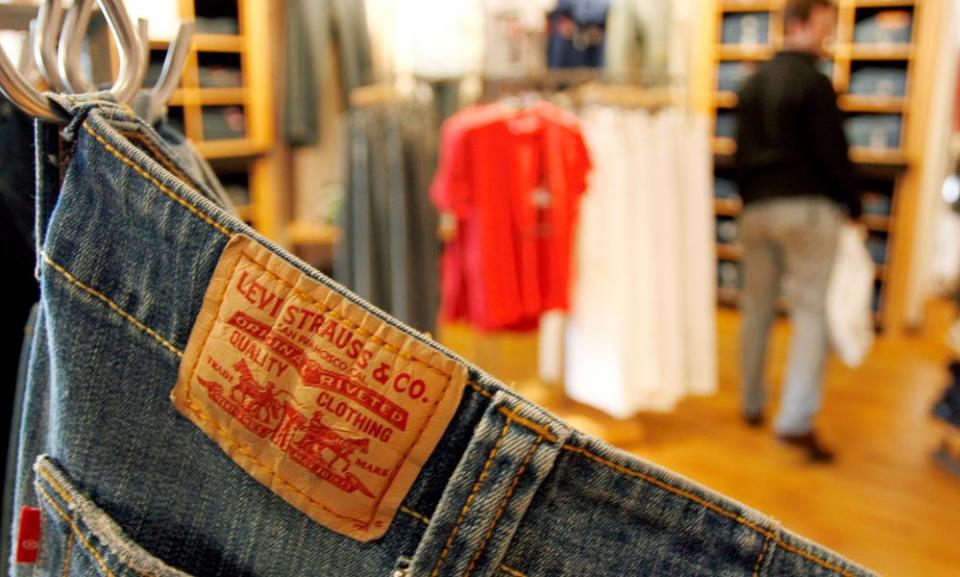Worker exploitation: without an international minimum wage, we're all worth 10 bucks | Van Badham

After scandals in the 1990s exposed shocking labour conditions in its supply chain, these days jeans brand Levi’s wears a commitment to ethical sourcing that you’d think would save it from protestors. But not so.
Last week in Sydney, a noisy crowd of labour activists demonstrated outside the Bondi Junction flagship store of a company publicly dedicated to “elevating the dignity of people who work to bring our clothing to market”. Similar protests this week have taken place outside Levi’s stores in London and New York. The Sydney action was a guerrilla fashion parade on a red carpet with protestors in denim jackets and jeans costumed as “double-denim disasters” and they accused Levi’s of double standards. Why?
Levi Strauss may have been the first multinational apparel company to establish workplace codes of conduct for their direct suppliers, but the modern, globalised supply chain is far longer than the direct suppliers covered by Levi’s existing policies. The protestors claim Levi’s products are shipped out from their seven factories in Madagascar though a port at Toamasina where the dockworkers who handle the products are subject to appalling exploitation by their employer.
The International Transport Workers’ Federation has been publicly profiling dockworkers who have toiled for decades without employment contracts, in dangerous conditions with long hours. They’re paid as little as $40 a month and 43 of them who have tried to join a union have recently been sacked, in breach of international and local labour law.
The immediate call from the activists is that Levi’s extend their supply chain code of conduct to transport workers, as well as join the coalition of those demanding the Madagascan government take action and enforce the law. But the standoff in Toamasina has, of course, a broader relevance among international discussions about governance, fairness, labour and the supply chain – which is why the protests against Levi’s have been international.
It’s in the long links of a supply chain dotted with contractors, subcontractors and sub-subcontractors where supposed oversights fail and abuses take place. We learned as much about this in Australia when Four Corners exposed the exploitation of workers on tourist visas in the agricultural industry. And it was the precise lesson learned by Levi’s to an audience of international horror in the 1990s, when one of its Marianas subcontractors, Tan Holdings Corporation, was forced to pay the largest fines in American labour history for subjecting workers to seven-day work weeks and 12-hour working days in conditions described by the US labour department as “slave-like.”
We have watched globalisation’s exploitation stories play out for decades now. There’s money to be made in the desperation of impoverished nations to attract industrial investment; just ask anyone from Melbourne’s old textile factories, or the shipyards in the British north-east, or the auto-parts makers in Ohio, US, who saw their jobs offshored to Asia and Mexico years ago.
Now, of course, “wage pressure” from Asia’s industrialised working class is tempting manufacturers to relocate to Africa. The American president’s daughter, Ivanka Trump, manufactures shoes through a Chinese company based in Ethiopia.
For populations such as Australia’s, where communities have been subjected to offshoring or threatened by it, where unemployment is high and concern about imported foreign workers undercutting Australian rates of pay is affecting government policy, one of the most constructive demands the community can make is to restart activism around the cause of international minimum wages.
As far back as 1928, the International Labour Organisation recognised the potential of today’s race-to-the-bottom scenario, and organised a convention on minimum wage-fixing machinery to impose a floor beneath which no worker should fall. It’s a difficult, aspirational, complex goal, but even a process that moves towards it has value.
Unlike playing countries off against one another, improving international minimum wages are in the interests of all populations, not merely because they improve the living standards of workers, but because they enable greater income tax revenue to government treasuries and more capital to flow through markets at the end where discretionary spending makes a difference.
If globalisation allows multinational corporations to base their operations where a worker’s value is a mere $10 a week, it sets up a situation ripe for competitive exploitation that becomes everyone’s problem. Without an international minimum wage, we’re all worth 10 bucks.
The solution can only be collective and it must be international. The Brexitish notion that nation states can just withdraw from the rest of the world and wall in their own production is a cultural fantasy as delusional as any who punch “Australia first!”, “America first!”, “Britain first!” statements into the keypad of a Chinese-assembled mobile phone.
While nationalists like Farage, Le Pen or Trump may insist the opposite, globalisation is entrenched not only due to labour and production processes, but due to the globalised tastes of a world market. Levi’s are a case in point; American jeans manufactured in Madagascar, sold in Australia and a recognised brand near everywhere on earth.
Consumers have bought into the material offerings of global supply chains with very few questions. If we don’t start demanding international standards and governments willing to enforce them, we’re condemning ourselves not merely to the false answers of nationalist demagogues, but to futures complicit in our own exploitation.

 Yahoo Finance
Yahoo Finance 